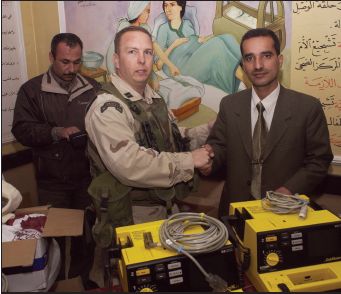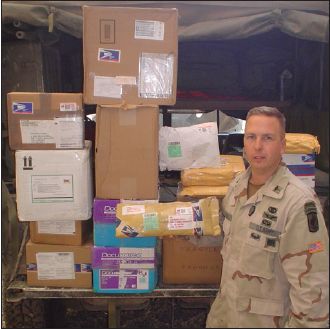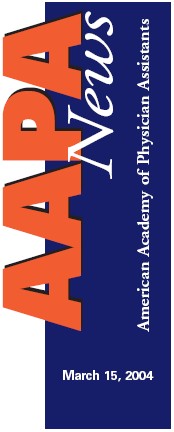By DOUG SCOTT
From time to time, an army truck driven by PA Capt. Robert Heath will arrive at a health clinic or hospital in central Iraq. All activity comes to a halt as large crowds of people from the medical facility gather outside to see what medical supplies or equipment Heath has brought. Mobbed like a Hollywood celebrity, Heath distributes medical journals, computers, and bandages to local health officials.
 |
| PA Capt. Robert Heath shakes hands with an Iraqi physician as they unload medical
equipment donated during a collection drive spearheaded by Heath. |
For most health facilities, it is more than they received at any time under the 35-year regime of Saddam Hussein.
Since last June, Heath and other members of the 173rd Airborne Brigade have been helping Iraqis rebuild and re-equip health clinics, primary health centers, and hospitals in an area near the city of Tuz, just north of Baghdad. But with military funding and supplies going to priority items such as police and security, Heath, a U.S. Army PA serving as medical project officer, has turned for help to an unusual source - people back home - to provide Iraqi medical facilities with supplies and equipment they desperately need to function properly.
"The local medical community needs a lot of work and lot of help here," said Heath, of the 11 local health clinics, eight primary health centers, and one hospital that he assists. "They are just illequipped. They have a lack of money, lack of equipment, lack of medications, and, for the doctors, lack of current medical journals, Internet access, and places where they can have access and learn."
Working with the local medical community and coordinating a program to get medical supplies are considered extra duties. The 1st Battalion of the 508th Infantry is a combat unit of the 173rd Airborne Brigade, not a medical team, and Heath's primary job is to serve as medical officer for approximately 600 men.
With the help of family and friends back home in Charlotte, North Carolina, Heath has been able to start a grassroots campaign that has contributed $82,000 in physical improvements to Iraqi health facilities in the Tuz area. Each week, Heath receives hundreds of packages containing medical supplies and equipment from Americans who have heard about his program.
Heath said that some people send boxes of much-needed gauze, bandages, alcohol swabs, and other miscellaneous items, while others donate big-ticket items, such as medical equipment and x-ray machines. Some people e-mail Heath and ask what specific items are needed most.
"One person wanted to donate a lot of money for medical items," recalled Heath. "This person had a dollar amount he wanted to donate, so I gave him a list of items that were needed, and he purchased those items and mailed them to me. He ended up sending four defibrillators."
"I believe Americans are truly patriotic," U.S. Rep. C.A. "Dutch" Ruppersberger (D-Md.) told AAPA News. "I commend innovative soldiers like [Heath]. It is dedicated servicemen and women like him that makes such a huge difference in the lives of so many."
Public support for the project started after The John Hancock Show on WBT Radio in Charlotte broadcast a story about Heath's work and interviewed his mother, Roberta Porter. Later, other local media outlets, such as News 14 Carolina, WBTV News, and the Charlotte Observer, ran stories, so it was not long before media in other markets did, too.
As the news spread, Heath linked up with Marty Horn, whose son Brian is a sergeant in the same battalion as Heath. Months earlier, Marty Horn had created a Web site (www.anysoldiers.us) to assist people in the United States with sending care packages containing food, clothing, and toiletries to soldiers stationed in Iraq. Horn dedicated a portion of the Web site to Heath's project.
"I heard that Capt. Heath needed medical supplies," recalled Marty Horn, "so we were running several Web pages on him, what [people] could send, and pictures of what he was doing. I don't really know who was doing what to help Heath, but he got back to me later and said, 'Oh my gosh, this is really, really working,' and it grew from there."
 |
| PA Capt. Robert Heath stands in front of a newly arrived shipment of donated medical
supplies that will be given to Iraqi hospitals and care centers. |
Others have contributed to Heath's project. Don Thompson, an independent manufacturer's representative in the Charlotte area, after hearing about it on the radio, got five clients to donate $20,000 worth of medical supplies, including 40 wheelchairs, 330 cases of alcohol gel, 50 cases of alcohol prep pads, and four weight scales. Beverly Qualheim of Logandale, Nevada, has created a Web page (www.bevscountrycottage.com/iraqbabies.htm) through which homemade hats, booties, and blankets can be distributed to children in Iraqi medical facilities.
"Along with all the medical equipment and books, I get boxes and boxes containing 15 to 20 knitted caps, booties, homemade blankets, and diapers," laughed Heath, whose wife Shirley, son, and two daughters live in Savannah, Georgia. "It keeps the children warm and has made a huge impact with the community."
By the time this article is published, Heath expects to be redeployed back to his home station of Vicenza, Italy. However, Heath's work in Iraq is not over. Another PA, Maj. Joel Meyer, will take over Heath's project when he arrives in Iraq.
Updated information and pictures of the Iraq medical donation efforts can be found at AnySoldier.com/OtherEfforts.cfm.
(This page used by AnySoldier.com with permission of American Academy of Physician Assistants, AAPA News - March 15, 2004.)



